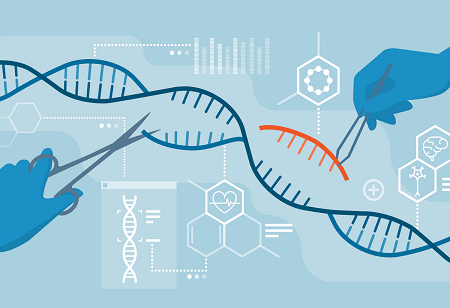Fiona Catherine Jerry | Sunday, 13 August 2023

Gene editing technologies, particularly CRISPR-Cas9, are redefining the pharmaceutical industry by facilitating scientists to manipulate the genetic code with unprecedented precision. These technologies have opened up new possibilities for developing targeted therapies and personalized medicine. The gene editing market is projected to grow from USD 5.3 billion in 2023 to USD 10.6 billion by 2028 at a CAGR of 15.0%. By editing specific genes, scientists can potentially cure genetic diseases, enhance the efficacy of drugs, and even prevent the transmission of certain inherited disorders. The ability to precisely modify the genetic code holds great promise for advancing medical treatments and improving patient outcomes. They have the potential to transform drug discovery, development, and personalized medicine in several significant ways -
Target Identification and Validation: Gene editing allows researchers to create accurate disease models by introducing specific genetic mutations associated with diseases. This enables a better understanding of disease mechanisms and the validation of potential drug targets, reducing the risk of targeting ineffective pathways. Additionally, gene editing can help identify new drug targets that were previously unknown. By manipulating genes in different cell types, researchers can study their effects on various disease pathways and identify potential targets for intervention. This knowledge can lead to the development of more effective and precise treatments for specific diseases, ultimately improving patient outcomes.
Drug Screening and Validation: Gene-edited cell lines and organisms provide more relevant models for drug screening, leading to more accurate predictions of drug efficacy and toxicity. This helps in identifying promising drug candidates and discarding those with undesirable effects early in the development process. Furthermore, gene editing allows researchers to validate potential drug targets by directly manipulating the genes involved. By selectively turning off or modifying specific genes, scientists can observe the effects on cellular function and determine if the target is suitable for drug intervention. This approach not only saves time and resources but also increases the likelihood of success in clinical trials, ultimately benefiting patients by providing them with safer and more effective treatments.
Gene Therapy: Gene editing technologies facilitate gene therapy approaches. Single gene editing or the introduction of a healthy version of the gene may treat genetic disorders brought on by single gene mutations. This can be done by employing CRISPR-Cas9, a precise gene-editing tool that can target and modify only particular genes. By correcting the underlying genetic cause of a disease, gene therapy has the potential to provide long-lasting and even permanent solutions for patients. Furthermore, the use of gene therapy may also extend beyond genetic disorders and be applied to other conditions, such as cancer, where specific genes can be targeted to inhibit tumor growth and enhance the effectiveness of existing treatments. Fiona Barry, editor-in-chief and associate director at PharmSource, a GlobalData company, mentions in an article published in Pharmaceutical Technology - “We anticipate that more than 100 more gene therapies and gene-modified cell therapies will be approved over approximately the next six years,”
Vaccine Development: Gene editing can be used to engineer viruses for vaccine development. This allows for safer and more effective vaccines by precisely modifying the viral genome. By using gene editing techniques, scientists can precisely manipulate the genetic material of viruses to eliminate their harmful properties while maintaining their ability to trigger an immune response. This approach not only reduces the risk of adverse side effects but also enhances the efficacy of vaccines. Furthermore, gene editing enables the development of vaccines for previously challenging diseases by introducing specific genetic modifications that enhance the immune system's recognition and response to the pathogen. Overall, gene editing offers a promising avenue for revolutionizing vaccine development and improving global public health.
Drug Delivery and Formulation: Gene editing can be employed to modify cells' responses to drugs, potentially enhancing drug delivery and efficacy. It can also be used to improve drug formulations and optimize dosage regimens. By editing specific genes involved in drug metabolism and transport, scientists can create cells that are more efficient at absorbing and distributing drugs throughout the body. Gene editing can help overcome drug resistance by modifying genes responsible for drug resistance mechanisms in cancer cells. This innovative approach has the potential to revolutionize drug delivery systems, leading to more targeted and effective treatments for a wide range of diseases.
Drug Repurposing: Gene editing can be used to understand how existing drugs interact with specific genetic backgrounds. This insight can facilitate drug repurposing for new indications. By using gene editing techniques, researchers can identify which genetic variations make certain individuals more susceptible to certain diseases or how they may respond differently to certain medications. This allows for a more personalized approach to drug repurposing, as it enables scientists to tailor existing drugs to target specific genetic profiles. Ultimately, this can lead to the discovery of new uses for drugs that were originally developed for different purposes, expanding treatment options and potentially reducing the time and cost required for developing new drugs. Gene editing can also be combined with immunotherapy, a promising approach that harnesses the body's immune system to fight cancer cells. By editing certain genes, scientists can potentially enhance the immune response and improve the success rate of immunotherapy treatments. This integration of gene editing with other therapies opens up a whole new realm of possibilities for personalized and targeted therapies. Thus, the pharmaceutical research and development landscape is changing as a result of gene editing technologies. These technologies hold great promise for altering the way we approach healthcare and medicine by enhancing the precision and efficacy of drug discovery, enabling personalized treatments, and addressing diseases that were previously incurable.